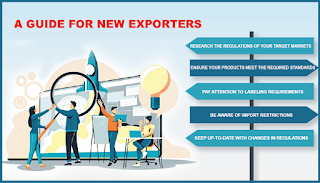Analysis Market Regulations: A Guide for New Exporters
Exporting goods and services to international markets can be a lucrative opportunity for businesses looking to expand their customer base and increase profits. However, navigating the complex world of international trade can be daunting, especially for new exporters. One crucial aspect of exporting that businesses must understand is market regulations. In this blog, we will provide a comprehensive guide to market regulations for new exporters, breaking down the key concepts and providing tips for successful compliance.
Understanding Market Regulations
Market regulations refer to the rules and standards set by governments and international organizations to regulate trade and protect consumers. These regulations vary from country to country and can cover a wide range of areas such as product standards, labelling requirements, and import restrictions. As an exporter, it is your responsibility to ensure that your goods and services comply with the regulations of the countries you are exporting to.
Why Market Regulations are Important
Complying with market regulations is crucial for the success of your export business. Failure to comply can result in your goods being rejected at the border, delays in customs clearance, and even legal consequences. Non-compliance can also damage your reputation and lead to loss of business opportunities. Understanding and adhering to market regulations is essential for building trust with your customers and ensuring the smooth flow of trade.
Tips for Complying with Market Regulations
1. Research the regulations of your target markets
Before exporting to a new market, it is essential to research the regulations that apply to your product or service. You can consult with trade associations, government agencies, or hire a customs broker to help you understand the requirements. It is also advisable to seek legal advice from a lawyer familiar with international trade laws.
2. Ensure your products meet the required standards
Many countries have strict standards for products, such as safety and quality requirements. Make sure your products meet these standards before exporting to avoid rejection at the border. You may need to obtain certifications or undergo testing to prove compliance.
3. Pay attention to labeling requirements
Labeling requirements vary from country to country, and failure to comply can result in your products being held at the border. Make sure your labels include all the necessary information such as product name, country of origin, ingredients, and safety warnings.
4. Be aware of import restrictions
Some countries have restrictions on importing certain products, such as food, pharmaceuticals, and chemicals. Make sure you are aware of these restrictions before exporting to avoid any issues at customs.
5. Keep up-to-date with changes in regulations
Market regulations are constantly evolving, and it is crucial to stay informed of any changes that may affect your exports. Subscribe to trade publications, attend trade shows, and maintain regular communication with your import partners to stay updated.
In conclusion, understanding market regulations is a crucial aspect of exporting, and non-compliance can have serious consequences for your business. By researching and staying informed, you can ensure that your exports meet all the necessary requirements and avoid any pitfalls. Compliance with market regulations can help build a strong reputation for your business and pave the way for successful international trade.




Comments
Post a Comment